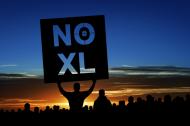
TransCanada clings to Keystone myths
 Yesterday we co-published a report with NRDC and Forest Ethics that busted the myth that the Keystone XL pipeline would lower gasoline prices for U.S. and Canadian consumers. It is actually more likely to raise prices by diverting oil from refineries in the Midwest, which are focused on serving the domestic market, to refineries on the Texas Gulf Coast, which are focused on producing diesel for export. This shift to the Gulf Coast means that less gasoline may be available to the U.S. market as the refineries there produce far less gasoline from a barrel of crude oil than their Midwest counterparts.
Yesterday we co-published a report with NRDC and Forest Ethics that busted the myth that the Keystone XL pipeline would lower gasoline prices for U.S. and Canadian consumers. It is actually more likely to raise prices by diverting oil from refineries in the Midwest, which are focused on serving the domestic market, to refineries on the Texas Gulf Coast, which are focused on producing diesel for export. This shift to the Gulf Coast means that less gasoline may be available to the U.S. market as the refineries there produce far less gasoline from a barrel of crude oil than their Midwest counterparts.
So it was amusing to see the company proposing the pipeline publish an op-ed on the St. Louis Today website the same day that hashed over the same old tired arguments. One of the most worn out and spurious of these is the one in which more production from Canada is purported to displace “conflict oil from the Middle East, Venezuela and Nigeria — where American values and interests are not shared or respected”.
This ignores the realities of the global oil market, the burgeoning U.S. export trade in petroleum products, the existence of Gulf Coast refineries that are directly tied to OPEC suppliers and the fact that if America really wants to be free of so called “conflict oil”, the best path to freedom is efficiency and diversification, something many of the pipeline’s supporters in Congress are actively opposing.
The last point there is crucial because if we really want to “displace” oil from countries we’re uncomfortable about trading with then we need to simply consume less oil. Importing more Canadian oil into the Gulf Coast does not actually displace oil from elsewhere in any meaningful way. This is because in a global oil market, the threat to America’s security posed by the instability or hostility of major global oil suppliers is not significantly diminished by switching suppliers.
This was clearly demonstrated in a Congressional Budget Office report released earlier this month, which is summed up in this infographic. The report argues that U.S. energy security is primarily about the price stability of oil and the cost to U.S. consumers of oil supply disruptions. It goes on to argue that increased domestic production would do little to dampen prices resulting from disruptions because the privately owned oil industry in America does not have an interest in maintaining spare capacity. This is exactly the same situation in Canada and the report uses Canada as an example of an oil exporting country that remains vulnerable to global oil market volatility.
It also discusses how OPEC’s likely response to any rise in non-OPEC production significant enough to lower international oil prices would be to constrain production to bolster prices. Its conclusion concurs with what we have been saying; reducing demand is the only genuine energy security strategy for a country that has both the highest total and highest per capita oil demand in the world.
The report released yesterday showed how Keystone XL would likely raise gasoline prices in the U.S. and it is the clearly stated aim of the project to raise the price U.S. refineries (and Canadian ones for that matter) pay for Canadian crude closer to the price paid for other imported crudes. So the only price stability the project would bring would be the more stable linking of Canadian crude prices with the volatile international price.
Then there’s the issue of displacing OPEC imports into America. This is unlikely because two of our biggest OPEC suppliers, Saudi Arabia and Venezuela, directly own over 1.3 million barrels per day of refining capacity in the United States, most of which is located on the Gulf Coast.[1]. These refineries are there to provide those countries with enhanced profits from their crude oil supply and are not about to cease importing oil from home just because more Canadian oil is available. In fact, Saudi Aramco will directly profit from Keystone XL.
America is inextricably linked to the global oil market and Keystone XL will do little more than further entrench that situation. It is literally a pipeline linking Canadian oil to America’s biggest export refineries. Claims that it will somehow reduce dependence on OPEC or enhance U.S. energy security just don’t stand up to scrutiny.
[1] The Saudi national oil company, Saudi Aramco, owns 50% of Motiva Enterprises LLC, which operates refineries totalling 970,000 b/d capacity in Port Arthur, Texas and Norco and Convent, Louisiana. The Venezuelan national oil company, PDVSA, fully owns CITGO, which owns refining capacity totalling 859,000 b/d in Corpus Christi, Texas, Lake Charles, Louisiana and Lemont, Illinois as well as asphalt production facilities on the east coast.
